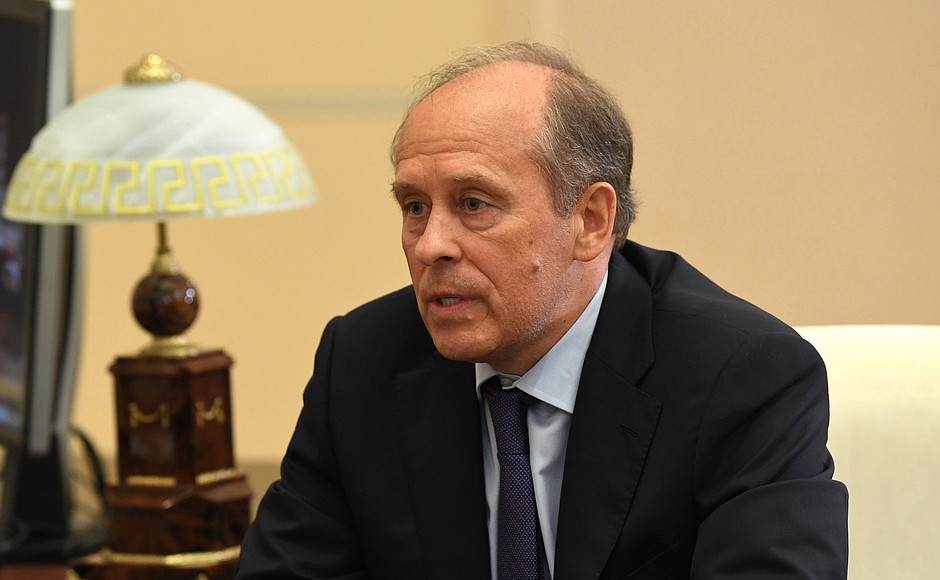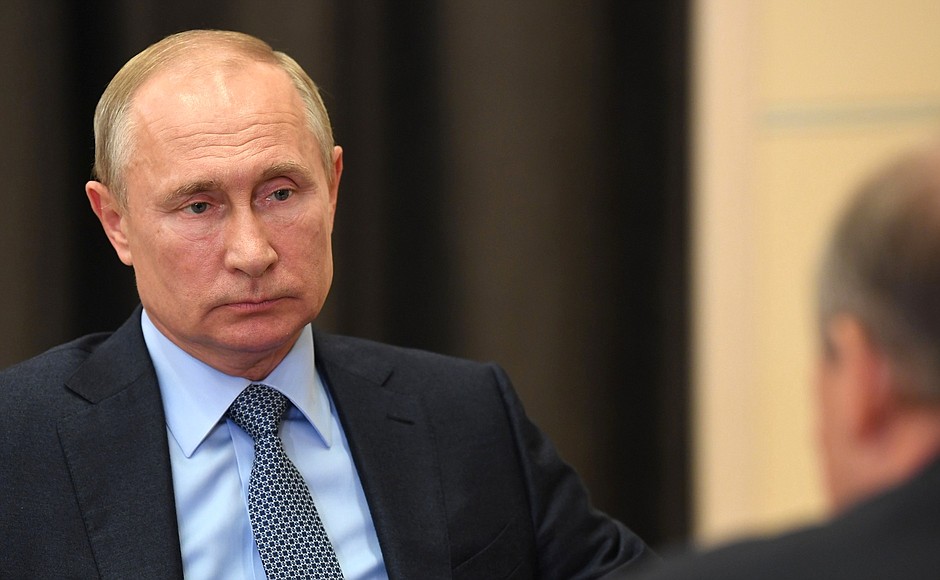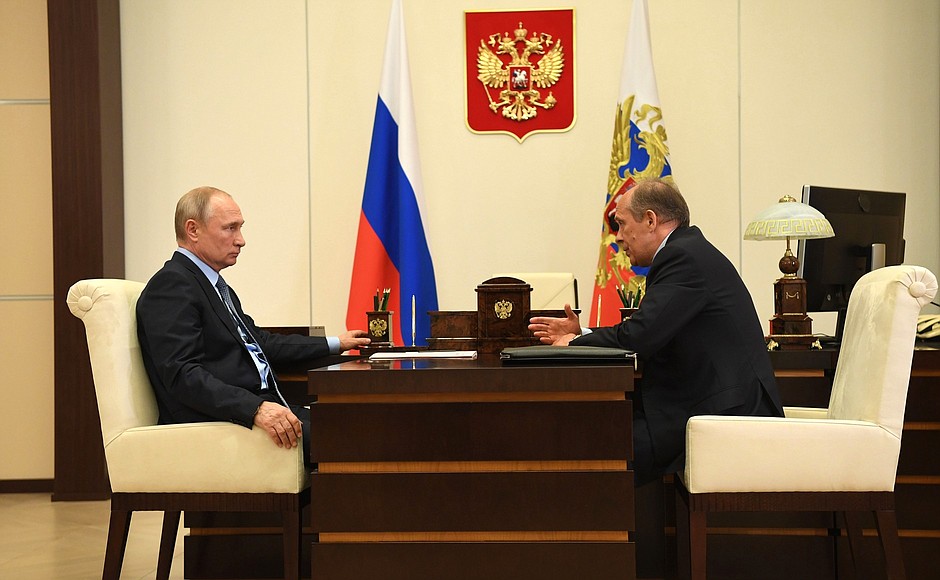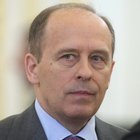President of Russia Vladimir Putin: Mr Bortnikov, you wanted to report on the performance of the National Anti-Terrorist Committee.
Please.
Director of the Federal Security Service Alexander Bortnikov: Mr President, a little bit of history. When Russia faced a wave of terror back in the 1990s and the 2000s, we had to rebuild the system of counterterrorism measures, and in 2006, in line with your resolution, the National Anti-Terrorist Committee was established and work began to build a national system of measures to counter terrorism.
It is noteworthy that back then the National Anti-Terrorist Committee included, in addition to law enforcement officers, representatives of executive and legislative bodies, and we have actively involved representatives of various civil agencies, religious figures and businesspeople to comprehensively understand and implement decisions developed by the National Anti-Terrorist Committee.
To date, the system of measures to counter terrorism operates at the federal, regional and municipal levels.
I would like to note that through our joint efforts we have managed to eradicate organised criminal groups in the North Caucasus, which has helped ensure security at such large international forums and competitions in Russia as the 2013 Universiad in Kazan, the 2014 Olympic Games in Sochi, the European championships in 2018 and other events where representatives…
Vladimir Putin: TheFIFA World Cup.
Alexander Bortnikov: Yes, exactly.
Of course, a lot has been done. As a result of this work, but unfortunately at the cost of big problems and losses, we have managed to reduce terrorist activities in Russia, above all in the North Caucasus.
I would like to refer to the statistics for the past ten years, from 2010 until the present. While 778 crimes of a terrorist nature were reported in 2010, last year we recorded only four. Of course, we cannot be one-hundred-percent certain that our work will completely eliminate the terrorist threat but we are striving for that.
Over the past decade, we have prevented 698 terrorist-related crimes, including 159 actual terrorist attacks. These results were achieved thanks to both the personnel of the federal operations headquarters and the entire system built by the NAC.

We have focused a lot of effort on exposing aiding and abetting groups and intercepting the sponsorship of terrorist activity. Our records show that over these past ten years, we have exposed 728 cases involving sponsorship of terrorist activity and all of this activity has been suppressed.
As far as the work of the committee itself is concerned, since the NAC was established, we have placed great emphasis on its regulation and the development of the necessary legal framework. This work has been done more or less from scratch, involving a scrupulous examination of international law. However, since the committee’s establishment, we have developed and published 79 federal laws, 30 presidential executive orders, 152 government resolutions and various directives in this area. In other words, we have built up a sufficient regulatory framework although, naturally, we make certain modifications from time to time based on the analysis of the current situation in the country and the experience of international organisations.
We closely cooperate with specialised committees of the UN Security Council – in particular, the UNSC Counter-Terrorism Committee and the UNSC Counter-Terrorism Committee Executive Directorate.
I can definitely state that the NAC’s experience has been in demand by the global community. Why? Because every year, at the UNSC’s initiative, our committee holds year-end briefings at the UN Security Council. Representatives of various Western security services and foreign countries are interested in our experience. Of course, we share this information and build up our own expertise as we do so.
We understand very well that it is impossible to address the task of combatting- terrorism by force alone. This is why preventing terrorist crimes is one of the approaches to organising our work.
Since 2008, in agreement with you and with your support, we have carried out work to counter the terrorist ideology in Russia. A corresponding programme was developed and implemented during the next five years of the working plan to counter terrorist ideology. As of today, the plan you have approved for 2019–2023 is being implemented.
It must be noted that following the prevention policy that we carried out in Russia, together with interested agencies and institutions, the level of radicalisation has decreased significantly; this is a fact. Moreover, I would like to say that this was a one-of-a-kind task, carried out with people who either were involved or took part in criminal activities with a terrorist element. Over 500 were dissuaded from taking part in these activities. Of course, we are continuing this work.
With your permission, some time ago the Federal Security Service also began significant work with our partner special services in other countries.

Vladimir Putin: This is what I wanted to ask. Is this a bilateral effort?
Alexander Bortnikov: Yes, this work, both bilateral and multilateral, is constantly being carried out. Unfortunately, this year we had to postpone the planned events due to the pandemic, but I hope we will catch up, although the experience coming from working on this platform provides us with an opportunity to exchange information with our colleagues, help each other identify and prevent brewing terrorist attacks and cooperate, including directly during combat.
As part of these operations and at the initiative of the Federal Security Service, we started promoting the concept of creating a common counter-terrorism information space in which different states, security services and law enforcement agencies could consolidate their information in order to use it more efficiently.
As part of this project, in 2009 we started building an international data bank, a database that would combine various sorts of information concerning terrorist-related activity, events and specific individuals. As of today, 56 security services from 42 states and eight international organisations are connected to this international data bank. We are continuing with the development of this approach while relying on the capabilities of international platforms.
The UN Security Council has shown great interest in this work, as I said, and they are providing necessary assistance to us. Of course, the Foreign Ministry and the Russian Security Council discuss these efforts on a regular basis and keep our partner services and representatives of foreign states up to date.
Mr President, our work follows a specific plan. I would like to inform you that today I chaired a regular NAC meeting and we discussed the prevention of terrorist activity in the Volga Federal District.
We will make sure that we improve our performance and increase our efficiency.
Vladimir Putin: Good.
<…>

